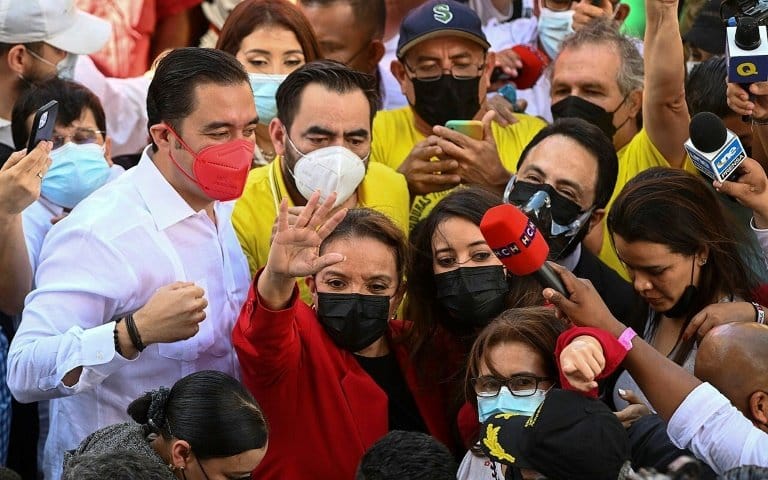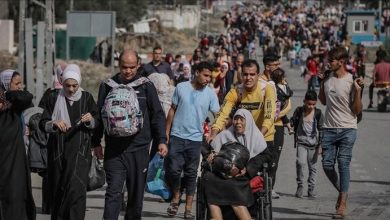Castro to be sworn in as first woman president of Honduras

Xiomara Castro will be sworn in Thursday as the first woman president of Honduras, which is grappling with poverty, migration, drug trafficking and corruption, after apparently resolving a crisis in congress that threatened her leadership.
The 62-year-old leftist former first lady’s inauguration will put an end to 12 years of right wing National Party rule.
“Twelve years of struggle, 12 years of resistance. Today the people’s government begins,” Castro, the wife of former president Manuel Zelaya, who was deposed in 2009, wrote on Twitter.
In order to implement her campaign promises, Castro needs the support of congress but last week a crisis broke out when rival factions in her Libre party voted in their own presidents of the legislature.
Negotiations to end the impasse seemed to have reached a successful conclusion on Thursday as Castro’s choice, Luis Redondo, opened a legislative session.
Rebel Libre deputy Jorge Calix, who presided over a rival session on Tuesday, did not repeat the move this time.
On Wednesday night, Castro revealed she had offered Calix the job of Cabinet Coordinator — a similar role to chief of staff — in her government, in a bid to convince him to drop his claim to the congress president role.
Calix, who had led a band of close to 20 dissident Libre deputies supported by the right wing opposition, sparked hope of a breakthrough by replying to Castro with: “You will soon receive my answer.”
– ‘Deep crisis’ –
The congress dispute is an embarrassing distraction for the president-elect, with US Vice President Kamala Harris, King Felipe VI of Spain and Taiwan Vice President William Lai due to attend the inauguration.
Once she assumes office, Castro will inherit “a country in a deep crisis, above all a social crisis, whose despair, whose deterioration of living conditions have become so profound,” Eugenio Sosa, a sociologist at the National University of Honduras, told AFP.
The main reflection of the crisis, he added, “is in the massive exodus of families to the United States.”
Castro’s challenge, though, before even taking office, was to try to resolve the congress dispute.
The schism emerged last Friday when a group of Libre dissidents ignored an agreement with the Savior Party of Honduras (PSH), whose support was key to Castro winning the November elections.
PSH leader Salvador Nasralla agreed to withdraw from the presidential race in return for the position of vice president and a pledge to support the PSH’s Redondo as president of congress.
But dissidents refused, arguing that congress should be led by the party with the most members — Libre has 50 deputies, to just 10 for the Savior party.
The dispute turned nasty, with some deputies coming to blows.
Castro accuses the dissidents of allying with the National Party of outgoing president Juan Orlando Hernandez to prevent the changes she promised in her campaign, including the restitution of laws against impunity that were rolled back by the previous administration.
– Migration talks –
During her visit, US vice president Harris is due to hold talks with Castro on the root causes of Central American migration toward the United States, a senior US official said.
“The topics will include expanding economic opportunity, combating corruption, and humanely managing migration,” the official added.
Some 71 percent of the close to 10 million Hondurans live in poverty, according to an NGO called FOSDEH.
“Everyone wants to leave because there’s no work. If there were more job opportunities here, there would be no need to look for another country,” university student Jensi Davila told AFP in Tegucigalpa.
Honduras is also wracked by violence instigated by criminal gangs involved in drug trafficking. The murder rate is close to 40 per 100,000 inhabitants.
Lai is due to hold separate talks with Castro and Belize Prime Minister John Briceno during his visit.
Taiwan’s foreign ministry said Lai’s meeting with Castro would be “to exchange views on issues of mutual concern.”
Honduras is among just 14 countries that still recognize Taiwan.
China, which considers Taiwan a part of its territory, has spent decades successfully encouraging the island nation’s allies to switch sides.
During her election campaign, Castro vowed to “immediately open diplomatic and commercial relations with mainland China” if she won.





